Wednesday, August 14, 2024. Annette’s News Roundup.
Joe is always busy.
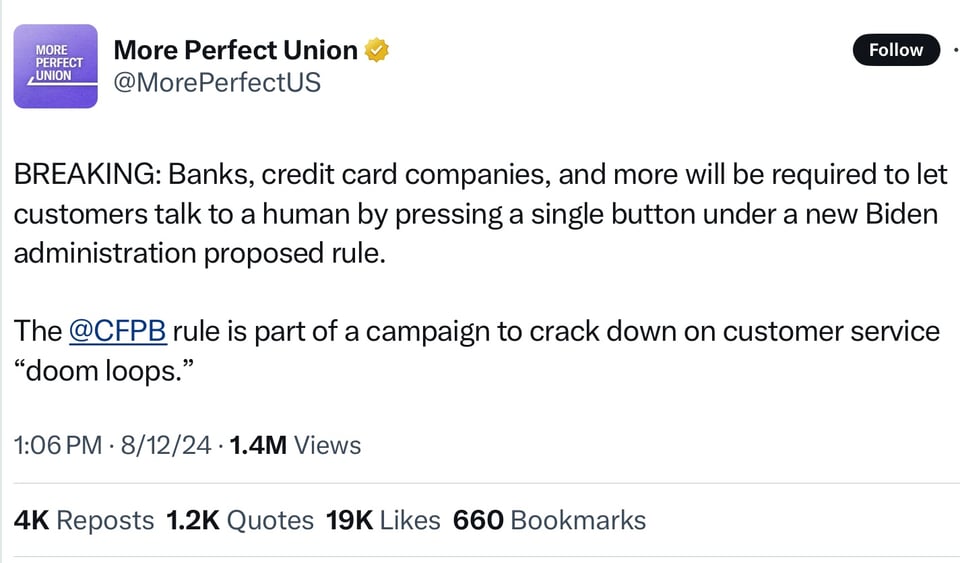
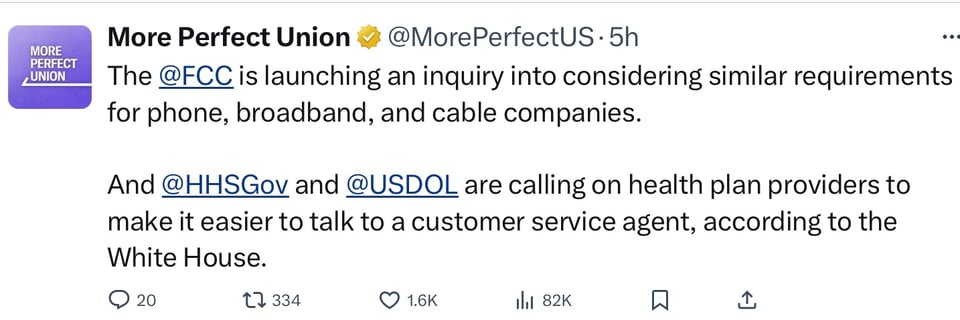
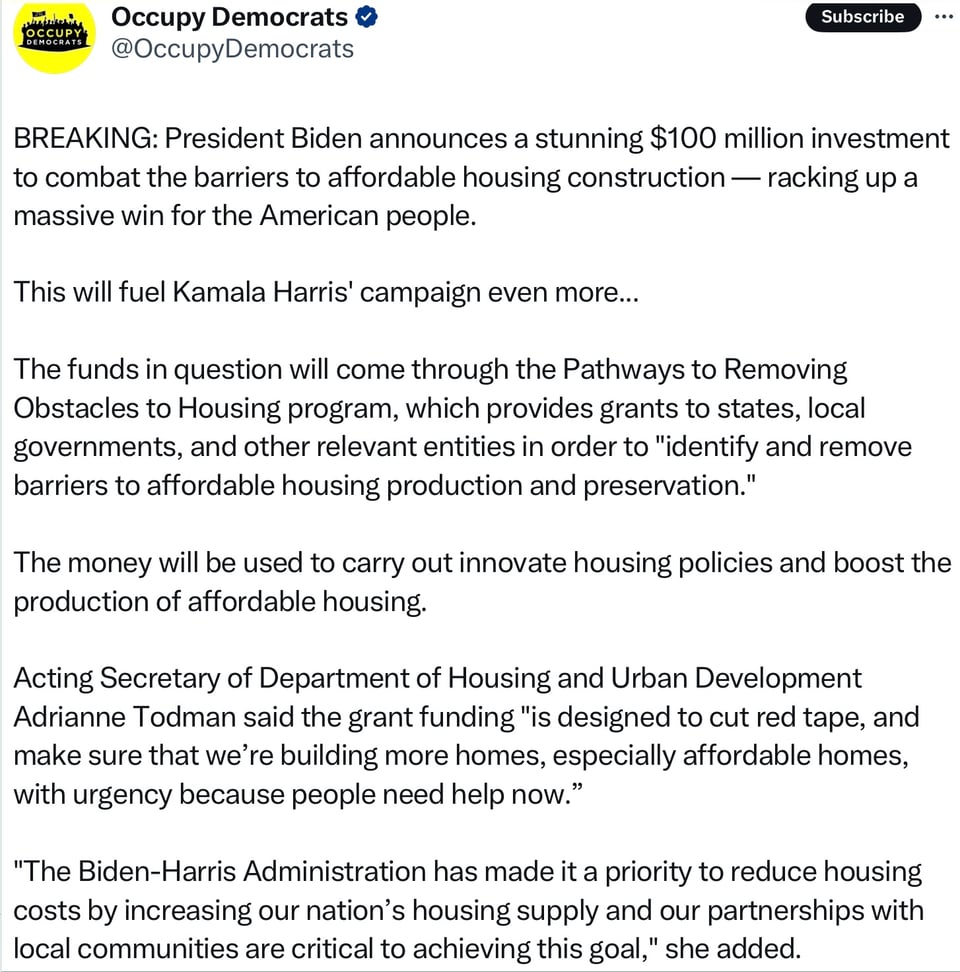
Kamala is always busy.
Blue candidates are coming together to form a winning team.
Vulnerable Senate Democrats hop on Harris-Walz wave.
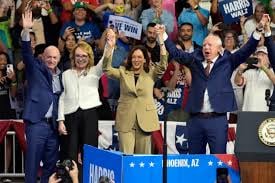
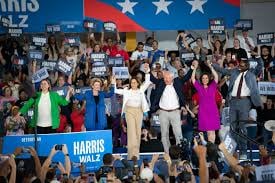
Democrats running for Senate are cozying up to the party's presidential ticket, after avoiding any connection to the Biden campaign.
Why it matters : Senate Democratic hopefuls had quietly resigned themselves to having to win by overcoming Biden. Now, they see a chance for a boost from the top of the ticket.
Democratic candidates like Sens. Jacky Rosen in Nevada and Tammy Baldwin in Wisconsin appeared beside Vice President Harris at events across the country last week.
Rosen, Baldwin and others had taken steps over the last few months to avoid the Biden campaign and its lagging numbers in key swing states.
The big picture: The change ends an awkward standoff between the Senate campaigns and the Biden team, and shows a renewed Democratic confidence in the top of the ticket.
There is now optimism in the Senate campaigns that Harris and Minnesota Gov. Tim Walz won't be a drag on their chances of winning.
Instead, senior Democratic strategists told Axios that Democratic Senate candidates are riding the wave of energy and momentum that Harris has generated.
Between the lines : Baldwin (D-Wisc.) spoke on stage at a Harris-Walz rally in Wisconsin last week, after not appearing with Biden in the state last month.
Sen. Bob Casey (D-Pa.), a top Biden ally who continued to embrace the president despite his struggling campaign, also joined Harris and Walz in Pennsylvania.
Yes, but: There are some Senate Democrats who are keeping Harris at arms length.
Sen. Jon Tester (D-Mont.), running perhaps the most difficult race of all incumbents, has not endorsed the vice president. He will need to significantly outperform the top of the ticket if he wants to win in November.
Sen. Sherrod Brown (D-Ohio) has endorsed Harris, but the presidential campaign did not make a stop in increasingly-red Ohio. And Brown is in a similar bucket as Tester, faced with having to outperform Harris and Walz to keep his seat. (Axios)
Harris’ surprising Rust Belt strength.
For the first time in months, the Democratic Party has reason for hope in the Rust Belt states known as the "Blue Wall."
Why it matters : Vice President Kamala Harris has closed the gap on former President Trump in the states that have long been key to the party's 2024 strategy, but had been growing out of reach for President Biden.
Before he suspended his campaign, Biden was trailing Trump by 2.4 percentage points in Michigan, 2.3 percentage points in Wisconsin and 4.4 percentage points in Pennsylvania, per FiveThirtyEight's average of state polls.
By the numbers: A New York Times/Siena College poll out last week found that Harris leads Trump by four percentage points in Wisconsin, Pennsylvania and Michigan among likely voters in the states.
Pollster Nate Silver has Harris up by 3.8 percentage points in Michigan in his election model. She's up by 3.6 percentage points in Wisconsin and 1.9 in Pennsylvania.
FiveThirtyEight, which Silver founded, also has Harris up in Michigan by 3.3 percentage points; 3.3 percentage points in Wisconsin; and 1.6 percentage points in Pennsylvania.
Reality check : Polling in 2016 and 2020 in these states underestimated Trump compared to the eventual election margins, CNN's Harry Enten notes.
In 2016, polling underestimated Trump by nine percentage points in polls in Michigan, Pennsylvania and Wisconsin. In 2020, he was underestimated by five points in these states compared to the final vote totals.
What to watch : Polling offers just a snapshot in time and there are still questions over whether the Harris campaign can sustain its momentum for the next several weeks until Election Day.
But polling shows that her favorability is rising. In Pennsylvania, the Times/Siena poll found that her favorability has grown 10 percentage points over the last month. (Axios)
Kamala Harris to release her first major economic plan as a presidential candidate in North Carolina on Friday.
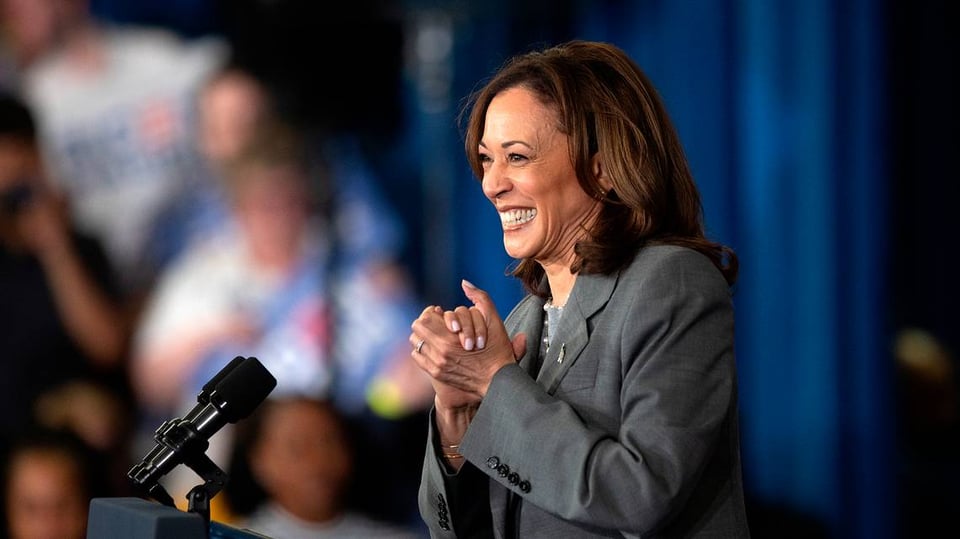
Vice President Kamala Harris is set to deliver a speech Friday to roll out her economic portfolio in Raleigh, North Carolina, marking the first time Harris has released a major policy initiative since President Biden dropped out of the race last month.
Harris is expected to announce that she will make tackling inflation a "Day One" priority, as well as outline a plan to lower costs for middle class families, take on corporate-price gouging and an overall focus on lowering costs for Americans, according to details shared by Harris-Walz campaign officials.
According to the most recent CBS News poll, only 9% of registered voters rated the condition of the national economy as 'very good' with the economy and inflation ranking as the top issue of concern consistently across 2024 polls. Inflation has cooled since its peak in June 2022, but many voters are still feeling the financial strains. Prices are still 20% higher overall than prior to the COVID-19 pandemic.
Friday's economic policy remarks come after Harris pledged to eliminate taxes on tips and raise the minimum wage during her rally in Las Vegas on Saturday, her only two economic policy proposals so far.
“When I am president, we will continue our fight for working families including to raise the minimum wage and eliminate taxes on tips for service and hospitality workers," Harris said while speaking to rally attendees that included Nevada Culinary union members.
A Harris-Walz campaign official added that her pledge would require legislation.
This marked the first time Harris made a proposal on eliminating taxes on tips for service workers, a similar idea to one first pitched by former President Donald Trump, in June while giving a rally also in Las Vegas.
In 2025, lawmakers are set to have a major opening on tax legislation given the expiration of some tax changes made during Trump's presidency in 2017. Control of Congress will be key on this issue given that Republicans held the House, Senate and White House when Trump's 2017 tax cuts became law.
Since becoming the presidential candidate, Harris has underscored her promised commitment to serve the middle class as she campaigns across battleground states.
When I am president, I will continue that work to bring down prices," Harris said at a campaign rally in Glendale, Arizona, on Friday. "I will take on big corporations that engage in illegal price gouging. I will take on corporate landlords that unfairly raise rents on working families. I will take on Big Pharma and cap the cost of prescription drugs for all Americans.
Harris promised the over 15,000 attendees adding, "unlike Donald Trump, I will always put the middle class and working families first."
Throughout battleground states, voters often tell CBS News that the economy remains a top issue when heading to the voting booths.
"Workforce development, creating job opportunities, making sure everyone can advance in different career fields, " said Abraham Camejo in Las Vegas ahead of Harris' rally on Saturday when asked about economic priorities. "The policies that benefit big corporations and the middle class are different."
According to a CBS News poll, on having policies that will improve people's finances, Harris trails Trump with 45% of registered voters saying they'd be financially better off with the former president, compared to 25% for Harris.
Prior to becoming the presidential candidate, Harris embarked on an Economic Opportunity tour throughout 2024 in efforts to address voters' top concerns on the economy and to promote the Biden-Harris' administration's economic achievements. Harris was then campaigning as Mr. Biden's running mate. (CBS News).
An update. The Hill reported on Monday - “More voters trust Harris than Trump on economy: Survey.”
More voters say they trust Vice President Harris to handle the economy than they do former President Trump, according to a poll released Monday by the Financial Times and the University of Michigan Ross School of Business.
Harris leads Trump 42 percent to 41 percent in the August poll when respondents were asked which candidate they trust to handle the economy, regardless of whom they plan on supporting in November.
The issue of the economy has long been viewed as pivotal in an election cycle, and Trump long had the edge on the issue over Biden.
The new poll was conducted Aug. 1-5 with 1,001 interviews. The margin of error is 3.1 percentage points. (The Hill, citing the Financial Times)

The Democratic National Convention begins on Monday.
Biden's handoff to Harris set for DNC in Chicago.
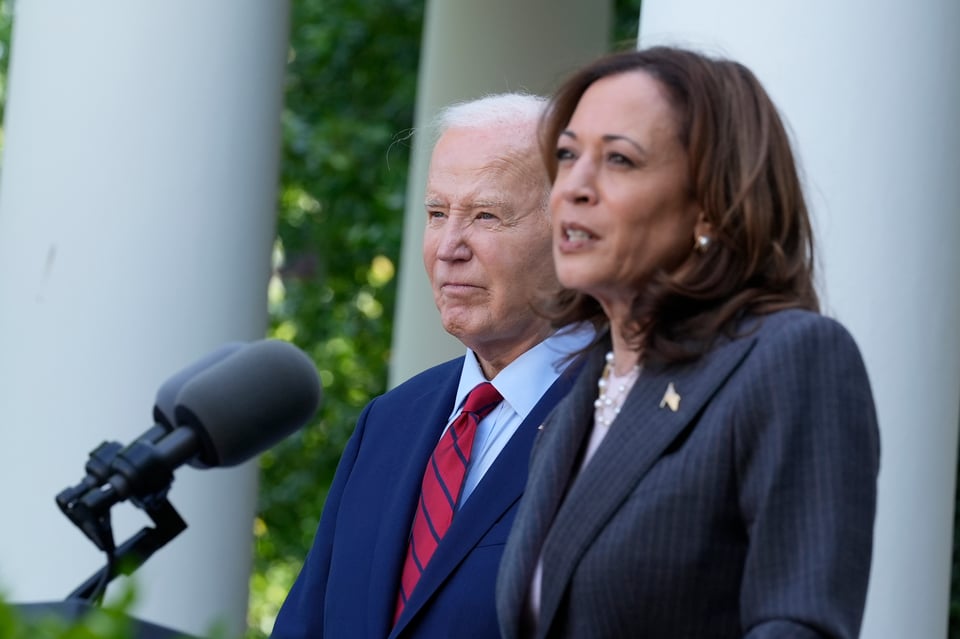
President Biden plans to address the Democratic National Convention on its opening night, touting his partnership with Vice President Kamala Harris.
Why it matters: Biden's speech Monday night in Chicago will amount to a changing of the guard ceremony for Democrats, as the president kicks off a convention that he had intended to close as his party's nominee.
It will be a goodbye that Biden resisted for weeks, as pressure built within the party for him to drop out of the race after his disastrous debate against Donald Trump in June.
Now Biden, as a sitting president who wanted another term, will be in the unusual position of celebrating his own accomplishments while trying to persuade Americans to pick another Democrat for the White House.
Democrats want Biden to focus on his legislative legacy, including the passage of a bipartisan infrastructure law, a massive climate and health care bill, and the Chips and Science Act.
Party planners typically have months to plan four nights of political choreography. Since Biden's sudden withdrawal on July 21, they've had four weeks to rework a convention that will honor Biden and re-introduce Harris to America.
Driving the news: Former Secretary of State Hillary Clinton also is slated to speak Monday night. Former President Obama will take the prime-time speaking slot on Tuesday night, as NBC News first reported and Axios confirmed.
Per tradition, Wednesday night will be devoted to the vice-presidential pick, with Minnesota Gov. Tim Walz (D) speaking after former President Clinton, widely regarded as one of the party's best setup speakers.
The convention will culminate in Harris' acceptance speech Thursday night.
"To paraphrase one of President Biden's favorite poems, it's a convention lineup well-constructed to make hope and history rhyme," said Jeff Nussbaum, a former Biden speechwriter.
Between the lines: Democrats have enjoyed great fundraising success from their "three presidents" routine.
Now they'll try to tease out the act over three nights.
What we're hearing: The speeches are being drafted but much of the speaker lineup is in flux.
"Beyond the nominee acceptance speeches on Wednesday and Thursday night, programming has not been finalized or announced yet," a convention official said.
Zoom out: For both parties, choreography has replaced drama at their summer conventions.
The goal is to use modern stagecraft and TV production tricks to introduce their ticket to a public that doesn't follow the campaign as closely as political obsessives do.
Organizers will try to create moments and personal stories that can be shared on social media and continue to be part of the party's messaging long after the convention. (Axios)
Tim is always busy.
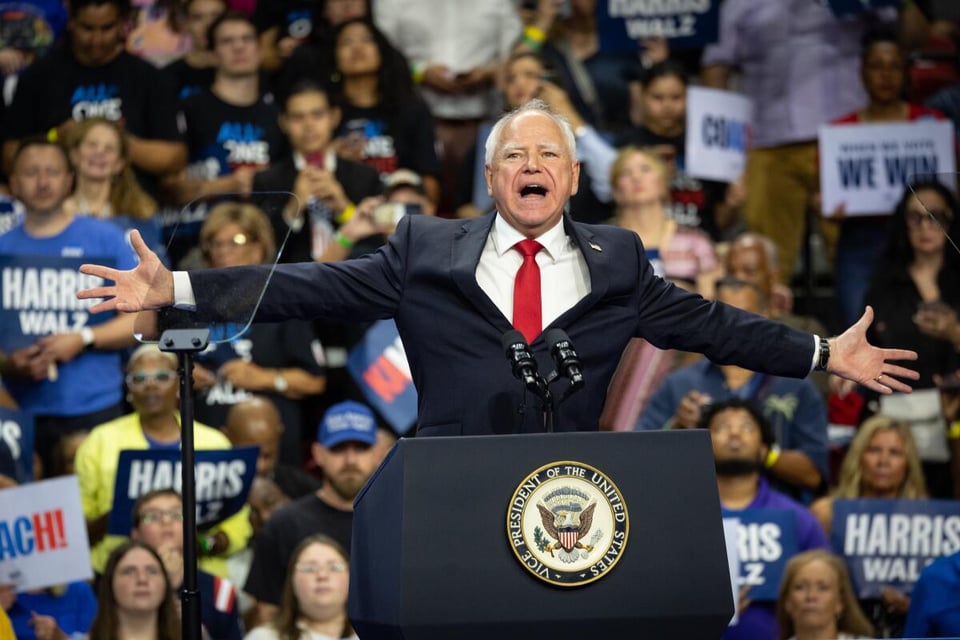
Tim Walz held his first solo campaign event since being selected as Kamala Harris’s vice-presidential nominee on Tuesday, rallying union members in Los Angeles and denouncing Donald Trump’s record on labor rights.
21 minutes.
The Minnesota governor’s appearance, at an event hosted by the American Federation of State, County and Municipal Employees, was the first in a five-state fundraising campaign as Walz ramps up support for the still-young Democratic ticket.
Speaking to thousands of union members in a darkened auditorium, Walz said he and Harris will support workers by bringing collective bargaining and other protections to “every state in the union”. The 1.4-million-member union has endorsed Harris.
“We know exactly who built this country,” Walz said. “People in this room built the middle class.”
He emphasized his and Harris’s history of supporting worker protections, including appearances that both candidates have made on picket lines and the ban Minnesota passed on captive audience meetings during his tenure as governor. Walz said that he was the “first union member on a presidential ticket since Ronald Regan”, but promised: “I won’t lose my way.” (Trump was a member of the Screen Actors Guild before resigning in 2021.)
Walz then pivoted to warn them of what the future might look like for workers if the former president and his running mate, the Ohio senator JD Vance, are elected, saying: “They see the world very differently then we do.”
“The only thing those two guys know about working people is how to work to take advantage of them,” Walz said. “Every single chance they’ve gotten they’ve waged war on workers.”
He described a future where bargaining rights, overtime pay and other protections would be cut, referencing steps that the Heritage Foundation’s Project 2025 outlines for restricting worker rights under a second Trump presidency.
A man wearing blue suit claps and smiles
‘He has a proven track record’: behind Tim Walz’s appeal to workers.
The Trump campaign has also courted union support. When Trump accepted the Republican nomination last month, he said he would rescue the auto industry from “complete obliteration”.
However, this morning the United Auto Workers union also filed federal unfair labor practice charges against Trump and Elon Musk over comments the two made during a live stream on Twitter/X, which included threats to fire workers for going on strike.
“You’re the greatest cutter,” Trump told Musk. “I mean, I look at what you do,” Trump said. “You walk in, you say, you want to quit? They go on strike, I won’t mention the name of the company, but they go on strike and you say, that’s OK, you’re all gone. You’re all gone. So, every one of you is gone.”
Walz concluded by referencing his own record of service, and attacks Republicans have made on his military service. “I’m proud to have served my country and I always will be,” he said.
On Tuesday Walz also addressed a fundraiser in Newport Beach, and plans to speak in Denver and Boston tomorrow, before heading to Newport, Rhode Island, and Southampton, New York, on Thursday.
At a fundraiser at the Balboa Bay Resort in Newport Beach on Tuesday, the Orange County Register reported, Walz peppered his 30-minute appearance “with Midwest jokes and self-deprecating quips”.
“I couldn’t be more surprised if I woke up with my head stapled to the carpet,” he told an attendee who asked whether he was surprised to be selected as the vice-presidential nominee, before refocusing on his running mate.
“You know better than anybody in this state what we’ve got in the vice-president. She’s found her voice,” Walz said
Walz also noted that his daughter, Hope, was in attendance at the Orange county event, before sharing his family’s story of conceiving Hope through IVF treatments.
Also in attendance were multiple California Democratic house members, including Reps. Nanette Barragán of South Gate, Mike Levin of San Juan Capistrano and Katie Porter of Irvine. Levin, who had been one of the first to call on President Joe Biden to abandon his re-election campaign, told the Register: “I want to win the election in November and defeat Donald Trump. Vice-President Harris and Governor Walz give us a great chance to do just that.”
Donors in Newport Beach, one of California’s wealthier and more conservative regions, have contributed $770,000 to Trump’s campaign this election cycle; compared with $145,000 for the Democratic campaigns, the Register reports, citing Federal Election Commission reports.
Walz’s fundraising tour will continue in Denver and Boston tomorrow, before heading to Newport, Rhode Island, and Southampton, New York, on Thursday. (The Guardian).
Candidate of the Day. Donate. Volunteer.Share.
On Monday, the Roundup featured Debbie Mucarsel-Powell, Democratic Candidate for Senate from Florida.
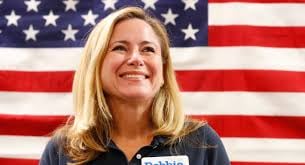
Mucarsel-Powell are in a statistical tie with voters in Florida.
But the new polling below 👇 suggests again that Debbie Mucarsel-Powell can beat Trump ole boy toy, Rick Scott, and help keep the Senate Blue.
Again, consider supporting Debbie Mucarsel-Powell for the Senate in Florida any way you can, if you haven’t done so yet. Donate. Volunteer. Share.
Debbie Mucarsel-Powell — Donate via ActBlue
Let’s bring Debbie Mucarsel-Powell home to the Senate.
New Polling Spells Trouble For Rick Scott
Could Rick Scott be defeated this year?
According to a new poll released this morning, Florida Senator Rick Scott has seen his approval ratings tank in recent months. The poll, which was conducted by USA Today and Suffolk University, polled 500 likely voters and found that only 35% of Floridians approve of Rick Scott's job, while 49% disapprove.
Importantly, Scott's approval ratings are underwater in all parts of Florida, including in North Florida, where Republicans have historically done well.
Among men, Rick Scott is seeing some increased support with 45% approving of his job and 44% disapproving, but among women in Florida, only 28% of those polled approve of Scott's job, while a staggering 52% disapprove. (MediasTouch).
One more thing. Or two
If you volunteer to make calls for Debbie, remind voters to vote for Harris-Walz and straight blue for all elected officials. But also to vote YES on Amendment 4 to undo Florida’s near-total Abortion Ban.
As of yesterday, amendments to overturn abortion bans are newly on the ballots in Missouri and Arizona. In November, these states will join Maryland, South Dakota, Colorado, Nevada and New York to give voters a chance either to overturn existing state anti-Abortion laws or strengthen a woman’s right to abortion in their states.
Signature-collecting efforts are occurring in other states too to get a measure on the November ballot to protect the right to abortion. Already, seven states — California, Kansas, Kentucky, Michigan, Montana, Ohio and Vermont — have supported abortion rights through the ballot.
Time to RSVP for this coming "Women Wednesdays for Harris" Zoom.
From Shannon Watts.
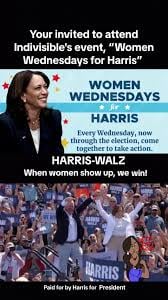
Last week, on our first “Women Wednesdays for Harris” Zoom, we talked about WHY getting off the sidelines and finding your team to help you get out the vote is key to electing Harriz/Walz to the White House. Now it’s time to talk about HOW.
On Wed., Aug. 14 at 8:30 pm ET, join us to learn how to host a house party to help you connect to persuadable people, register them to vote, fundraise, and make a plan to GOTV from the inimitable George Hahn, Congressmembers Eric Swalwell and Lauren Underwood, activists Gina Ortiz Jones and Charlotte Clymer, Women for Harris leader Rhonda Foxx, and News Not Noise’s Jessica Yellin.
Whether you’re gathering to watch the convention or the debates or event just Zooming into Women Wednesdays together, house parties can make saving democracy fun. That’s why we’re having a cocktail/mocktail contest—send us your Harris or Walz-related recipe and we’ll announce the winner Wednesday night.
RSVP now for this Wednesday’s Zoom.
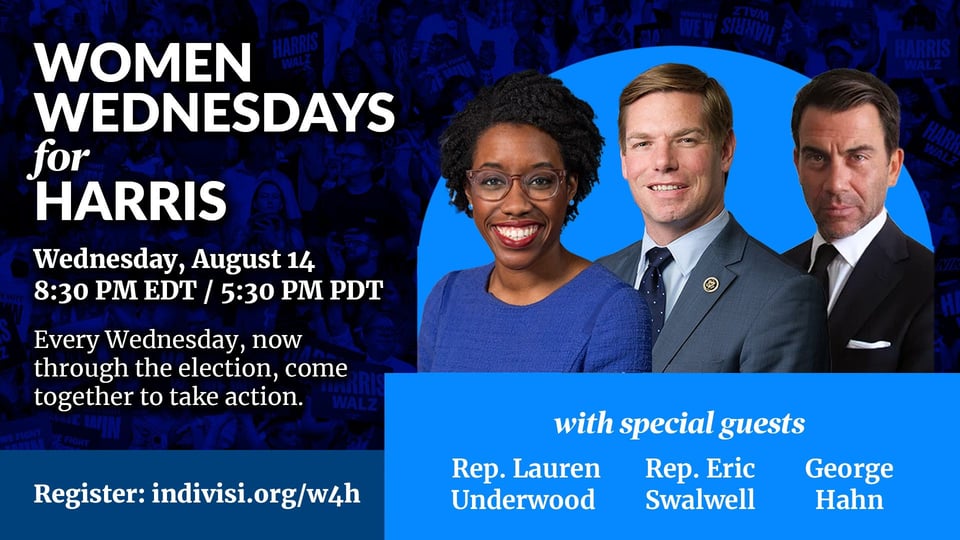
Some Republicans move away from Trump.
A sign of hope for America. Make Republicans Republicans Again.
Conservative gathering provides safe space for Republicans who aren't with Trump
ATLANTA (AP) — At the Republican National Convention and multiple rallies since, former President Donald Trump has been greeted as a hero who narrowly escaped assassination and is destined to lead a new American golden age.
At a recent conservative conference in Georgia, there was a different vibe.
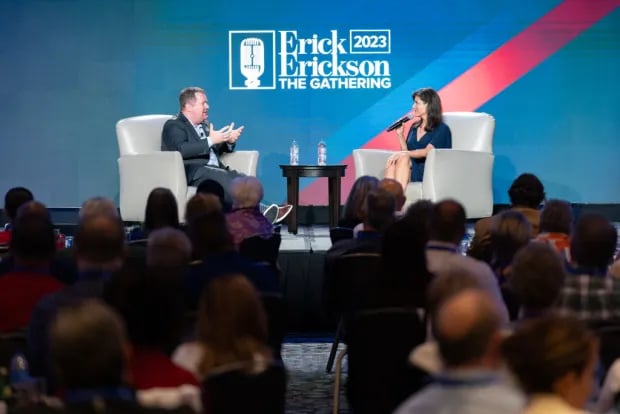
There were few, if any, red hats at “The Gathering,” the annual confab hosted by influential syndicated radio host Erick Erickson, and no rousing promises to “Make America Great Again.” Instead, Erickson’s guests, from rank-and-file voters up to Trump’s onetime vice president, spent two days critiquing the GOP’s path in the Trump era. And when it came to the November election, many of them spent more time hand-wringing over a Kamala Harris presidency than celebrating the promise of another Trump administration.
The dynamics are particularly problematic for the former president’s chances in Georgia, a longtime Republican stronghold that has shifted into a genuine two-party state, and a handful of other tossup states. They also serve as a reminder that despite his near-complete takeover of the GOP, Trump still has detractors and skeptics among conservatives whose decisions this fall could help determine whether he returns to the White House.
“I voted for him willingly in 2016, and then I held my nose and did it again in 2020,” said Atlanta small business owner Barton McMillan, a four-decade resident of the city who blames Trump for recent Democratic victories in Georgia, which backed Joe Biden for president in 2020 and elected two Democratic U.S. senators.
“This time, I don’t know what I’m going to do,” McMillan said. “And I’m representative of a lot of the people here.”
Indeed, Erickson’s assembly featured consternation over federal spending, abortion policy, Trump’s proposed tariffs, America’s uncertain role in the international order, the former president’s penchant for personal attacks, his fixation on the lie that systemic voter fraud was to blame for his 2020 loss and his false contention that his vice president at the time, Mike Pence, had the power to overturn Biden’s election.
“I cannot endorse President Trump’s continuing assertion that I should have put aside my oath to support the Constitution and act in a way that would have overturned the election,” Pence said.
Georgia Gov. Brian Kemp, who was recently blasted by Trump for not helping overturn the 2020 election, drew a standing ovation when he was introduced, laughter when he compared the former president to a tropical storm and more applause when he called for Republicans to focus on the future.
“We’re going to use our political operation to win Georgia despite past grievances,” Kemp assured Erickson without mentioning Trump by name. Trump has been indicted for his efforts to overturn the 2020 results in Georgia and elsewhere; those cases are pending.
In his criticisms, Pence pointed to the 2024 Republican platform that fails — for the first time in decades — to call for a national abortion ban and sidesteps the mounting national debt, which ballooned during Trump’s four years. Pence bemoaned an increasingly isolationist and protectionist bent among the GOP base — opposition to U.S. aid to Ukraine against Vladimir Putin’s invading Russian forces and Trump’s promise of sweeping tariffs in a second term.
The Republican Party, Pence said, is under a spell of “populism unmoored to conservative principle.”
Walter Michaelis, a 22-year-old getting ready to cast his second presidential ballot, stood and cheered the former vice president and said afterward that Trump’s “America First” approach can go too far, especially on tariffs and trade.
“I understand why Trump was needed in 2016,” Michaelis said. “But sometimes I do think it would be better now for the party to move on.”
Michaelis, who voted for Trump in 2020, said he would not back Harris but had not yet decided whether to vote for the former president again.
Kent Kim, a 30-year-old from Alpharetta, said he has decided to go with Trump. But he added, he’s withheld his vote from Trump before and said, “I know people who probably will do that this year.”
A key reason for Trump’s defeat was underperforming the usual Republican marks in suburban Atlanta, Philadelphia and Phoenix, areas that helped tilt Georgia, Pennsylvania and Arizona to Biden. Those same places also could boost Harris in the fall.
Senate Minority Leader Mitch McConnell, R-Ky., during his turn on stage with Erickson, tacitly acknowledged the risks as he lamented recent Republican losses in winnable Senate contests. He said that included Georgia, where Trump-backed Herschel Walker lost to Democratic Sen. Raphael Warnock in 2022 despite Republicans winning every other statewide election.
McConnell predicted a GOP Senate majority in the new Congress but sounded less confident about the presidency. Despite blaming Trump for the Jan. 6, 2021, insurrection at the U.S. Capitol, he has endorsed Trump for president.
“We all know who we hope will be the next administration,” he told Erickson. Yet McConnell outlined a conservative agenda without mentioning the former president except to support extending “the Trump tax cuts” of 2017.
And, echoing Pence, McConnell scolded a nameless Republican for turning away from the traditional U.S. role on the world stage.
“We’ve had occasionally these isolationist moods,” he said, noting that the 1930s gave rise to the original “America First” rallying cry. “That stopped after Pearl Harbor,” McConnell said, only for some U.S. conservatives to resist the establishment of NATO and the Marshall Plan to rebuild Europe after World War II.
McConnell warned that the same mistakes loom with North Korea, China, Russia and Iran “all talking to each other” as “an axis of powerful regimes.” McConnell said that demands an assertive international U.S. presence and more robust defense spending across Western democracies.
“If I had a message for the next administration ... take this seriously,” McConnell said.
Even some of Trump’s full-throated allies offered subtle warnings.
Former Georgia Sen. Kelly Loeffler and Erickson talked about her loss to Democrat Raphael Warnock in January 2021, when tens of thousands of Republicans who voted for Trump the previous November stayed home in the runoff after Trump openly questioned the veracity of vote counts. Loeffler did not blame Trump, as Erickson implicitly did, but she did emphasize that Trump, as he campaigns this year, is encouraging his backers to take advantage of any voting option: mail, in-person early voting or on Election Day.
Florida Sen. Rick Scott, who is running to succeed McConnell as GOP Senate leader, said in a brief interview that Trump is “going to be fine.” But when asked about Trump picking new fights within the party, Scott steered the conversation to his own success in a series of close gubernatorial and Senate contests.
“I try to make sure that, ultimately in my races, that there’s a choice, and it’s a policy choice. ... Just talk about the issues,” he said.
Asked whether he would offer Trump that advice, Scott replied: “Well, I mean, he’s going to run the race he likes to run.” (ABC News)
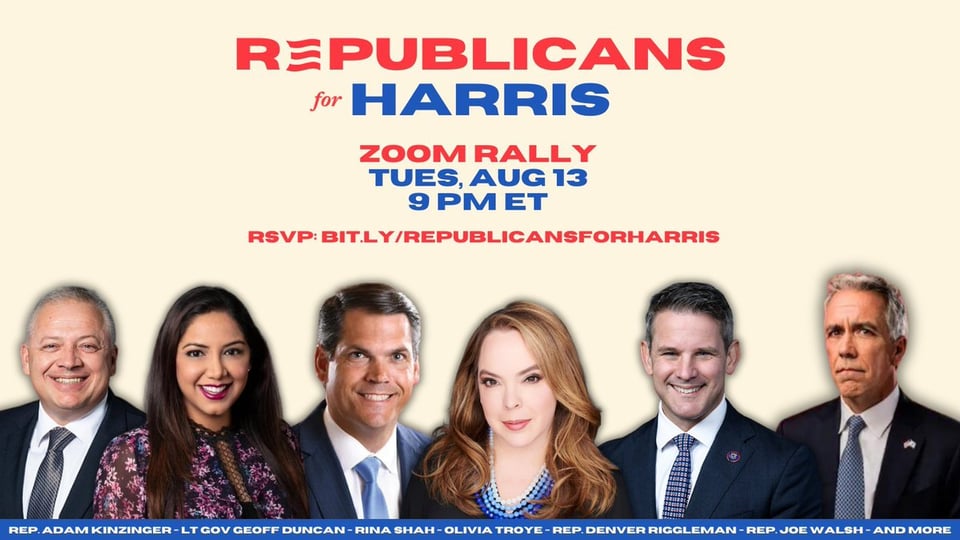
Conservative writer David French says he’s voting for Vice President Harris:
— Republicans against Trump (@RpsAgainstTrump) August 12, 2024
“If you've been a lifelong Republican, I've got news for you. This party is not the party you grew up with..”#RepublicansForHarris pic.twitter.com/EjL9MgVmld
Former Republican Rep. Susan Molinari backs Harris for president
— Republicans against Trump (@RpsAgainstTrump) August 13, 2024
Molinari, daughter of another prominent New York Republican, told Spectrum News NY1 she believes Harris is "smart," “strong” and “knows how to handle herself on the world stage.”
“And she's not crazy,” she said.… pic.twitter.com/gE8PNBjWYg
Oh, that’s what we should call Vance’s weird “policies.”👇
JD Vance, Donald Trump, and the rise of Republican “neopatriarchy.”
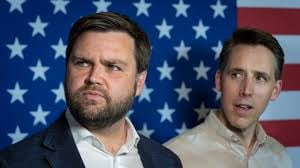
When you look at what the right’s rising leaders are saying, it’s clear that conservatives have become increasingly obsessed with the fate of the American family. From Republican vice presidential nominee JD Vance assailing “childless cat ladies” to Elon Musk fretting about a birth rate apocalypse, there is a deep and abiding sense that the family is in dire need of defense.
Recently, a loose group of conservatives has emerged with a solution: that the family can be defended by boldly reasserting the importance of old-school gender roles. The movement tells men to be strong and women to have babies without overtly insisting that women must submit to their husbands or stay at home. It’s an effort to revive an older model of gender relations without the explicitly sexist baggage (though it often resurfaces in a more subtle form).
I call this loose movement “neopatriarchy,” and have come to believe that it is at the root of both some of the modern right’s biggest ideas and its most interesting internal conflicts.
Concerns about the family’s health are hardly new on the right. Speaking in 1977, influential conservative writer Russell Kirk claimed that a nearly enacted universal daycare bill threatened to disintegrate the family and substitute the state.
“We would be foolish to ignore a drift in what we call ‘the West’ toward the supplanting of the family by the Universal Orphanage,” Kirk said, warning that the daycare bill specifically “would have encouraged even affluent mothers to consign their little children to the baby-bin and spend their days at bridge-clubs.”
Kirk’s fears reflected the central conservative preoccupation of the time: the threat from communism and the ever-growing powers of the modern state. It was “compulsory collectivism,” for Kirk, that threatened to tear familial bonds apart.
Modern neopatriarchy begins from the opposite fear; the concern is not communist collectivism, but liberal individualism.
The neopatriarchs believe we live in an age where people prioritize self-actualization and fulfillment above all else. Young adults, they argue, live in extended adolescence, lost in some combination of video games, drugs, and casual sex; as they age, raw hedonism is replaced by single-minded foci on money and career. According to neopatriarchs, this liberal social model fails men and women alike, funneling them toward a spiritually empty existence that all but guarantees disappointment and depression, and it fails society by discouraging the production of children who are quite literally required if the country is to have a future. (Immigration, needless to say, is not seen as an acceptable solution.)
The solution, for neopatriarchs, is to return to the past. Men need to rediscover the old John Wayne vision of masculinity, making traditional male gender markers (including acting as fatherly provider) into defining aspects of their identity. The state should play a role in encouraging this reversion, primarily by changing policy to cultivate “masculine” virtues and incentivizing marriage and child-rearing.
In his recent book Manhood, Republican Sen. Josh Hawley urges men to embrace strength and stoicism as routes for self-improvement, calling on them to take on the roles of “warrior” and “builder” in their everyday lives. The psychologist Jordan Peterson has long dispensed similar advice, helping turn him into a conservative guru. In his forthcoming book Dawn’s Early Light, Heritage Foundation President Kevin Roberts argues that contraceptive technologies “break the most basic functioning elements of civilization” by liberating individuals to have consequence-free sex out of wedlock. Vance, who wrote the forward to Roberts’s book, has mused about eliminating no-fault divorce for similar neopatriarchal reasons.
Neopatriarchy can be distinguished from straight-up patriarchy primarily through its treatment of women. Unlike some Christian fundamentalists or alt-right scribblers, neopatriarchs do not assert that women are obligated to be homemakers as a result of divine commandment or natural law. All they insist on explicitly is that women have lots of children, and that choosing to focus primarily on raising said children is no worse than having a career.
It’s obvious why liberals and leftists would have problems taking this seriously. If Americans are supposed to be having more kids, and American men are supposed to be more traditionally masculine, then who’s supposed to be doing the work of raising all of these kids? The answer, of course, is wives (as it’s certainly not immigrants). Neopatrarichy may not explicitly call for a reversal of the feminist revolution, but that’s basically what it’s going for.
Indeed, neopatriarchal writing rarely floats the idea that more men should be homemakers — and often suggests that women are happier at home. The choice to work is theoretically left up to women, but the traditional option is at the very least suggested. The neopatriarchal vision for women is thus most clearly expressed through popular “tradwife” and big-family TikTok influencers: women who became social media evangelists for a family-first lifestyle, occasionally giving up formal careers in order to do so.
But it’s not just feminists who have problems with neopatriarchy.
There’s a class of conservatives, mostly men, who despise the left primarily because it tells them what to do: that it’s offensive to ogle women or use male pronouns for a transgender woman. This group, famously termed “Barstool conservatives” after the bro-y Barstool Sports website, enjoys partying and casual sex — and resents people telling them to knock it off.
This has led to some real skepticism about neopatriarchal ideas. When Vance’s comments calling for non-parents to pay a higher tax rate came to light, Barstool Sports founder Dave Portnoy called Vance a “moron” in a post on Twitter/X.
“You want me to pay more taxes to take care of other people’s kids? We sure this dude is a Republican?” Portnoy asked. “If you can’t afford a big family don’t have a ton of kids.”
With Republicans out of the White House, these divisions have largely been confined to posting wars. But should Trump retake the presidency, his administration would likely include prominent neopatriarchical voices — including Vance himself. That would launch a high-stakes national debate over an issue some may have thought settled: whether the state should favor families with traditional gender roles. (Vox)
Your Daily Reminder.
Trump is a convicted felon.
On May 30th, he was found guilty on 34 felony counts by the unanimous vote of 12 ordinary citizens.
The Convicted Felon Donald J. Trump was scheduled to be sentenced on July 11. He will now be sentenced sometime around September 18th.
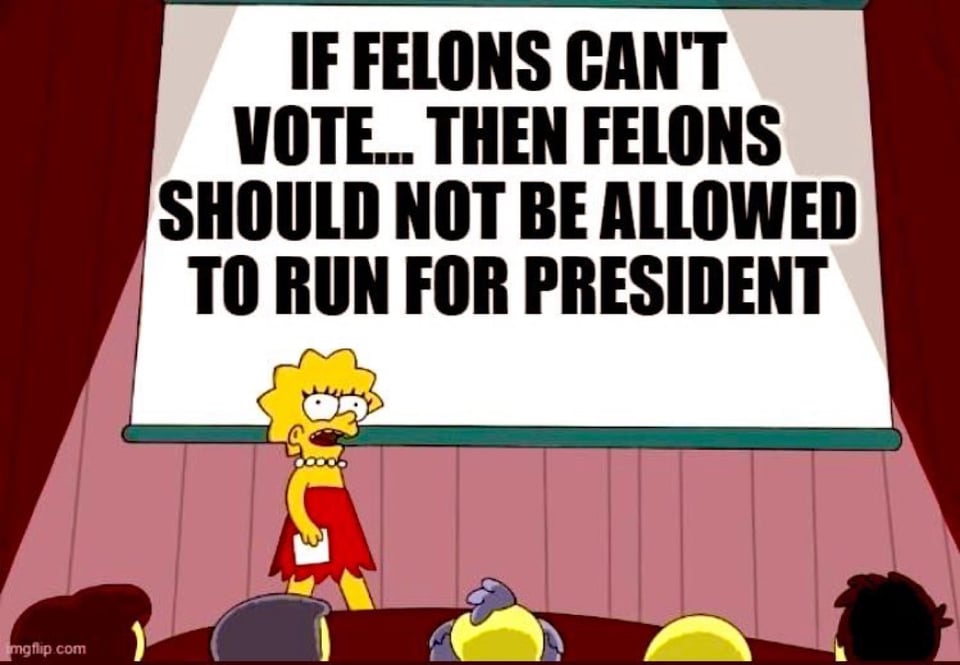
What the Olympics meant to one athlete.


“Having a chance to play for gold, represent my country, what my country did for me? Yeah, this is the highest on the pinnacle right here.”
—USA Basketball star Brittney Griner after winning a gold medal at the Olympics. The 2024 Games were her first time leaving the U.S. since returning from detainment in Russia.